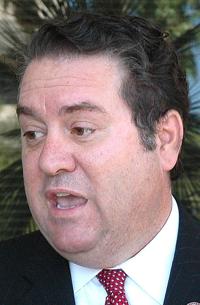PHOENIX — Attorney General Mark Brnovich is moving to block state universities from leasing their land to commercial businesses.
In a lawsuit filed Thursday in Arizona Tax Court, Brnovich contends the practice of removing property from the tax rolls is not only unfair to other taxpayers but also unconstitutional. He said the net result is that everyone else in the taxing district, whether city, county, school or community college, has to pay more to make up for what is avoided by the businesses that benefit.
Most immediately, Brnovich wants a judge to block any move that would exempt a parcel that Arizona State University owns on the southeast corner of Mill Avenue and University Drive in Tempe from taxes. A pending deal would create a 330-room Omni hotel and a 30,000-square-foot conference center.
Officials from the Arizona Board of Regents have defended the policy that they approved for such deals as bringing money to help underwrite the costs of running the university.
But if Brnovich wins, it would undermine similar deals where universities lease out their tax-exempt property for commercial development.
In the lawsuit, Brnovich acknowledges that state lawmakers have allowed some situations where property can be taken off the tax rolls in exchange for excise tax payments by the commercial entity. And he said universities are specifically authorized to operate research parks where private companies engaged in educational or research activities on university campuses pay a reduced property tax.
“ABOR is not, and has never been, authorized to rent out its tax-exempt status so that private real estate developers can build large buildings for private tenants while evading property taxes,” he said.
ASU, as a public university, is not supposed to operate as a commercial enterprise or urban development authority, he continued.
“It is inappropriate for this educational institution to pick winners and losers in the highly competitive property development industry by negotiating for the use of ABOR’s tax-shielding status,” said Brnovich, a Republican.
Brnovich said courts must step in now before the practice gets out of hand.
In a prepared statement, Arizona State University said the law is on its side and Brnovich is suing because “he wishes the law was different than it actually is.”
“This frivolous lawsuit is a huge waste of taxpayer money, time and energy, and it saps the public’s faith in our elected officials,” ASU’s statement says.
The Omni project that Brnovich is trying to ensure does not escape property taxes is not the regents’ first venture into leasing out university land to allow private companies to escape property taxes.
Most significant is the Marina Heights Project involving about 20 acres of land along Tempe Town Lake for private office space, including offices for State Farm Insurance. That deal leases the land to a private, commercial party for 99 years.
Brnovich also took aim at the Mirabella luxury senior living center, a 20-story project in Tempe scheduled to be completed in 2020 to include 252 independent-living apartments, 52 health-care units as well as an indoor pool, theater, art museum, spa, dog park and four restaurants.
Brnovich said regents have retroactively attempted to skirt the constitutional requirement for all commercial property to be taxed by adopting policies late last year for such projects.
One policy says the universities cannot engage in long-term commercial leases if the “primary purpose” is to remove private land and building from property taxes. Another requires universities to document the economic benefits of long-term leases to the university and the state.
Brnovich brushed these aside as legally meaningless, calling them “vague, non-preclusive mandates on universities” that still allow the regents to engage in future “unlawful and unauthorized developments” like the Marina Heights and Mirabella.




